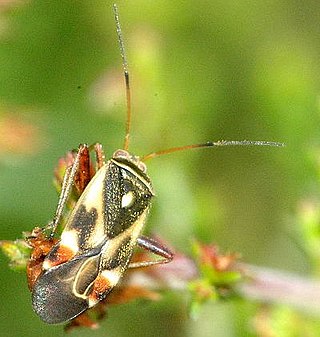
The Heteroptera are a group of about 40,000 species of insects in the order Hemiptera. They are sometimes called "true bugs", though that name more commonly refers to the Hemiptera as a whole. "Typical bugs" might be used as a more unequivocal alternative, since the heteropterans are most consistently and universally termed "bugs" among the Hemiptera. "Heteroptera" is Greek for "different wings": most species have forewings with both membranous and hardened portions ; members of the primitive sub-group Enicocephalomorpha have completely membranous wings.

Veliidae is a family of gregarious predatory insects in the suborder Heteroptera. They are commonly known as riffle bugs, small water striders, or broad-shouldered water striders because the segment immediately behind the head is wider than the rest of the abdomen. Species of the genus Rhagovelia are also referred to as ripple bugs.

Belostomatidae is a family of freshwater hemipteran insects known as giant water bugs or colloquially as toe-biters, Indian toe-biters, electric-light bugs, alligator ticks, or alligator fleas. They are the largest insects in the order Hemiptera. There are about 170 species found in freshwater habitats worldwide, with more than 110 in the Neotropics, more than 20 in Africa, almost as many in the Nearctic, and far fewer elsewhere. These predators are typically encountered in freshwater ponds, marshes and slow-flowing streams. Most species are at least 2 cm (0.8 in) long, although smaller species, down to 0.9 cm (0.35 in), also exist. The largest are members of the genus Lethocerus, which can exceed 12 cm (4.5 in) and nearly reach the length of some of the largest beetles in the world. Giant water bugs are a popular food in parts of Asia.

Scaptocoris is a genus of burrowing bugs in the family Cydnidae. There are at least four described species in Scaptocoris.

Water treaders, the superfamily Mesovelioidea, are insects in the order Hemiptera, the true bugs. They are semiaquatic insects that live in moist and wet habitat and on wet plant matter in several types of aquatic habitat.

Gerroidea is a superfamily of semiaquatic bugs in the order Hemiptera. There are at least 3 families and more than 2,000 described species in Gerroidea.

Belostoma is a genus of insects in the hemipteran family Belostomatidae, known colloquially as giant water bugs. Members of this genus are native to freshwater habitats in the Americas, with the greatest species richness in tropical South America. Most species in the family Belostomatidae have historically been included in Belostoma, but several of these have been moved to other genera. 9 species are claimed to be found in Northern America, but the genus Belostoma is actually divided into 16 subgroups containing about 70 species.

Polymerus is a genus of plant bugs in the family Miridae. There are at least 100 described species in Polymerus.

Hebrus is a genus of velvet water bugs in the family Hebridae. There are at least 160 described species in Hebrus.
Salda lugubris is a species of shore bug in the family Saldidae. It is found in Central America and North America.

Rhagovelia obesa is a species of smaller water striders in the family Veliidae. It is found in North America.

Tingini is a tribe of lace bugs in the family Tingidae. There are at least 250 genera and 2,400 described species in Tingini.
Phytocoris eurekae is a species of plant bug in the family Miridae. It is found in North America.
Salda is a genus of shore bugs in the family Saldidae. There are about 18 described species in Salda.

Mesoveliidae is a family of water treaders in the order Hemiptera. There are about 16 genera and at least 50 described species in Mesoveliidae.

Metacanthinae is a subfamily of stilt bugs in the family Berytidae. There are about 12 genera and 80 described species in Metacanthinae.

Gampsocorinae is a subfamily of stilt bugs in the family Berytidae. There are about 60 described species in Gampsocorinae.
Tylospilus is a genus of predatory stink bugs in the family Pentatomidae. There are about five described species in Tylospilus.
Microvelia americana is a species of smaller water strider in the family Veliidae. It is found in North America.
Platyvelia is a genus of smaller water striders in the family Veliidae. There are seven described species in Platyvelia.













